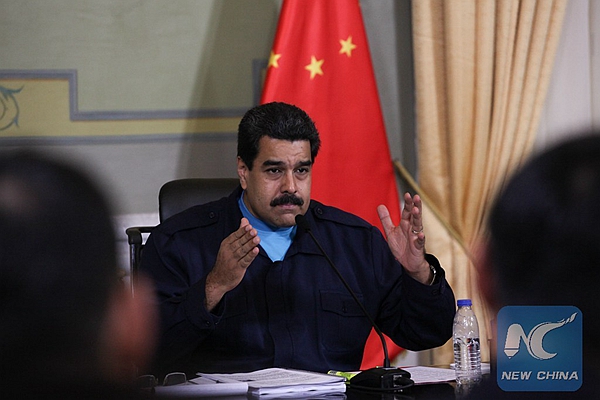The accelerated slow-motion coup against Venezuela
- By Earl Bousquet
 0 Comment(s)
0 Comment(s) Print
Print E-mail China.org.cn, August 15, 2017
E-mail China.org.cn, August 15, 2017
|
|
|
Venezuelan President Nicolas Maduro meets with a Chinese enterprises delegation, in Caracas, Venezuela, on Aug. 6, 2015. [Xinhua/Boris Vergara] |
The U.S.-backed slow-motion coup against Venezuela's President Nicolas Maduro and the country's ruling United Socialist Party (PSUV) has suddenly accelerated to top-speed.
An invasion by U.S. troops has now been put squarely on the table by the Commander-in-Chief President Donald Trump - surprise! - who used appropriately bellicose language on August 11 at one of his golf clubs to publicly assure the world he "will not rule out a military option" against Venezuela.
The Trump administration has launched a sustained new frontal attack on Venezuela since the July 30 election of the new National Constituent Assembly (NCA), providing the elected executive president with a constitutionally-backed and legally-protected legislative body to govern, in the face of a completely hostile, opposition-dominated National Assembly.
Washington and its allies choose to present the NCA initiative as a so-called "power grab" and they're gearing-up for their next big accelerator pedal push: to internationalize their plot.
A few days after the election of the NCA by eight million voters (representing 40 percent of the Venezuelan electorate), Washington and 16 South American allies gathered in Peru to announce a new series of hostile measures against Caracas, basically seeking to outlaw the NCA and criminalize contacts with it.
Unable to secure majority support at the Washington-based Organization of American States (OAS) for its anti-Venezuela plans, the U.S. shifted the theatre of action to Peru, creating a new front for an allied attack, this time featuring a regional political blockade backed by financial and economic strangulation led by the U.S. Treasury Department.
Following Venezuela's "temporary" expulsion from the regional trading bloc MERCOSUR, Maduro called for talks with his opponents. He also invited Latin American and Caribbean leaders to develop dialogue at an urgent meeting of the wider 33-member Community of Latin American and Caribbean States (CELAC). The Venezuela leader further pressed for an exchange, by telephone or in person, between himself and Trump.
Unfortunately, all the Venezuelan president's loud calls for dialogue fell on deaf ears in Washington, where only words of war and wars of words get any attention these days.
The next step will come during the 2017 United Nations (UN) General Assembly starting in New York in September, where the anti-Caracas alliance will seek to mobilize international opinion in favor of external intervention, albeit in the name of national salvation.
The U.S., U.K. and other hawks, backed by their usual allies, will promote and demand military, political, economic, financial and other forms of intervention.
With visible efforts already underway to use targeted U.N. agencies to punish North Korea and Venezuela, the roles of China and Russia as Permanent Members of the Security Council will definitely come into play.
Trump's threats to rain fire and brimstone on North Korea and his confirmation of considering military action against Venezuela are causing some strained nerves at the U.S. State Department and among American military top brass.
Time and distance, proximity and ease of deployment of American troops were repeatedly cited by Trump as he revealed his clear thoughts about war plans for North Korea and Venezuela.
However, any international intervention against either country will require the support of all Permanent Members of the UN Security Council.
China and Russia just recently offered all sides in the Korean Peninsula conflict a joint military de-escalation road map as a way out of the immediate crisis. China's President Xi Jinping also urged the sides to exercise restraint. Beijing (and Moscow) can now also expect to be called upon to take similar steps regarding Venezuela.
China does indeed have excellent ties with Venezuela.
Beijing and Caracas recently signed 22 agreements that included construction of a major refinery in China to process Venezuelan oil for the Chinese market.
China's oil purchases and other forms of petroleum industry assistance are also together helping reduce Venezuela's historical over-dependence on the American oil market.
A Trump threat to cut Venezuelan oil imports is hampered by warnings by at least five Republican senators, as well as top representatives of the U.S. petroleum industry, that stopping the flow of one-third of U.S. oil imports can seriously harm American companies - and drive consumer prices up.
Wall Street giants like Goldman-Sachs are also latching onto futuristic bargain-price purchases of Venezuelan bonds on the international market, much to the annoyance of Washington and the Venezuelan opposition.
In the UN, those promoting regime change in Caracas are also likely to point to Chinese and Russian support for Venezuela as impediments to their interventionist plans.
However, Beijing's consistent non-intervention policy is well known across the region; and while it also has bilateral ties with most of the neighboring states lining-up with Washington against Venezuela, China will not be guided by their decisions.
Besides, China's ties with nations, whether in the Korean Peninsula or South America, are based on mutually-agreed factors (that are always) beyond third-party influences.
Earl Bousquet is a contributor to china.org.cn, editor-at-large of The Diplomatic Courier and author of an online regional newspaper column entitled Chronicles of a Chronic Caribbean Chronicler.
Opinion articles reflect the views of their authors, not necessarily those of China.org.cn.







Go to Forum >>0 Comment(s)